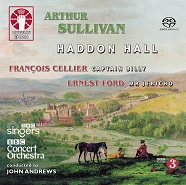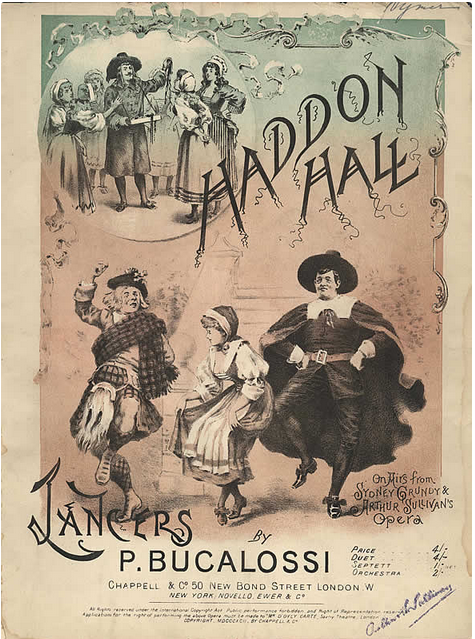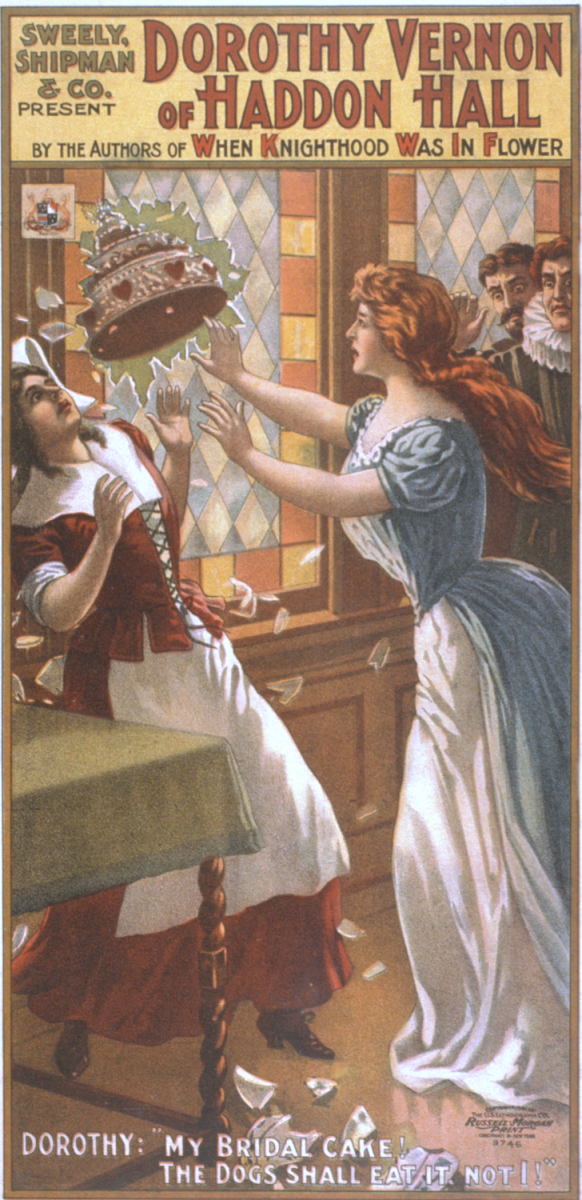John Groves
Operetta Research Center
23 March, 2020
In 2018 the National Gilbert and Sullivan Opera Company staged the first professional revival of Haddon Hall for about one hundred years. Although there were only two performances, which I reviewed for ORCA, the production generated much interest, if only because much of the music is Sullivan at his most inspired. Seeing that performing materials were now available again, the Arthur Sullivan Society and others decided to sponsor a recording, using the BBC Concert Orchestra and BBC Singers.

The CD release of Sullivan’s “Haddon Hall.” (Photo: Dutton Vocalion)
Sullivan had already composed two stage works steeped in British history (The Yeomen of the Guard and Ivanhoe), and he wanted Gilbert to be involved in another. But after the ‘carpet quarrel’ this was not possible. So when D’Oyly Carte needed a new work to replace The Gondoliers at the Savoy Theatre, he turned to Sidney Grundy, a successful playwright who had already written The Vicar of Bray, revived at The Savoy in 1892. Sullivan was at the forefront in shaping the sort of libretto he wanted, and the partnership with Grundy was very amicable, the librettist providing at least two versions of each musical number for him to choose.
Unfortunately, although the composer started work on the project in Monte Carlo in early 1892, he had a recurrence of his long-standing kidney disease which nearly killed him, which perhaps accounts for highly inspired numbers followed by less memorable passages, such as much of the finale to Act One. More information on the genesis of Haddon Hall and a brief synopsis can be found in my previous ORCA article.

Sheet music cover for Sullivan’s “Haddon Hall.” (Photo: Gilbert & Sullivan Archive)
However, the best passages such as Dorothy’s Act One solo “When Yestereve I knelt to pray” are superb. This particular number is used as the introduction to the first act which is unusual in featuring an off-stage chorus to begin the work: “Ye Stately Homes of England.”
Dorothy, the heroine, is in the very capable hands of Sarah Tynan, whose diction is exemplary. (If you do not agree, the libretto, including the spoken dialogue, is available online).
Lady Vernon is gorgeously sung by Fiona Kimm, her Act Three song “Queen of the Garden” is strongly reminiscent of Katisha’s song in The Mikado.

Courtice Pounds as John Manners in “Haddon Hall,” 1892. This publicity photo was probably a work for hire published by the D’Oyly Carte Opera Company.
The dashing John Manners is sung by Ed Lyon, with a timbre that continually reminds one of the late D’Oyly Carte tenor Thomas Round especially in his first act “The earth is fair”.
The comic role of Oswald, Manners’ servant is stylishly sung by Ben McAteer, whose Act One patter number “Come Simples and Gentles” is one of the highlights, not just because it is put over so well, but because of Sullivan’s inventive orchestration of the third verse.
Veteran bass Donald Maxwell sings the other comic role, McKrankie. Again, in his music, Sullivan enjoys getting the orchestra to sound like bagpipes.

Sheet music cover for Sullivan’s “Haddon Hall.” (Photo: Gilbert & Sullivan Archive)
Henry Waddington demonstrates a very lustrous bass voice in the role of Sir George Vernon.
In addition the BBC Concert Orchestra excels in the First Act Country Dance and in the orchestral storm in Act Two.
Curtain raiser & After piece
In Victorian times, audiences often expected a one-act ‘curtain raiser’ and an ‘after piece’. As a reminder: Trial by Jury started life as an after piece for La Périchole. Therefore the producers of these CDs decided to include two of those that were used at the Savoy in the early 1890s and still exist, including orchestrations, in the D’Oyly Carte archive. Both have recently been published as part of Musica Britannica by Stainer and Bell.

Sheet music cover for “Mr. Jericho.”
The curtain raiser is Mr. Jericho, “an operetta in one act” by Ernest Ford, who was on D’Oyly Carte’s music staff. It was first performed in 1893, before Haddon Hall, using the understudies for the main work, and boasting a Gilbertian style plot and text by Henry Greenbank (who later wrote the books for Jones’ The Geisha and A Gaiety Girl). It was later played as a companion to Ford’s full length opera Jane Annie which had a book by Conan Doyle and J. M. Barrie! The music was found to be “melodious, bright and pleasing” and very much in Sullivan’s style, not surprising seeing that he studied with Sullivan at the RAM.

Savoy Theatre program for double bill of “Captain Billy” and “The Vicar of Bray,” 1892.
The afterpiece is another “operetta”, Captain Billy by Francois Cellier. Both Francois and his brother Alfred (composer of Dorothy and The Mountebanks) had been choristers at the Chapel Royal with Sullivan. He was appointed Musical Director of the Opera Comique in 1879 and remained with the D’Oyly Carte organisation in various capacities for most of his life. He composed a number of short operas for the Savoy, but unfortunately much of his work is lost as it was never printed.
Both these one-acters are superbly performed by the cast of Haddon Hall, as if they had been living with them for years, not just for this recording. Both are well worth hearing, being in no way ‘second rate’ in any respect.

1906 production of “Dorothy Vernon of Haddon Hall.”
Musical Direction of these three works is in the stylish, very capable hands of John Andrews, and the superb recording was made at what used to be called Watford Town Hall (now Watford Coliseum) and has excellent acoustics – if you can silence the noise of traffic (it stands on what is now an enormous roundabout) which recording engineer Dexter Newman has been able to do!
I cannot recommend these three works too strongly. All have music of a high standard, performed and recorded likewise, giving us a glimpse into the world of the Victorian musical stage in the early 1890s and furthering our knowledge of this period. Many thanks to all involved!
For more information and further details, click here.

Excellent review supplemented by the usual high quality illustrations. I shall be placing my order right now!